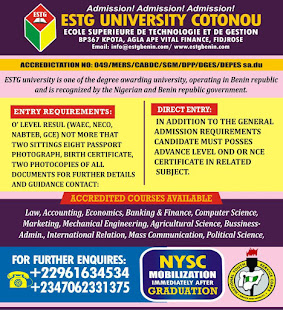The ninth national assembly has finally settled in after the conclusion of its Tuesday, June 11, leadership election which was preceded by weeks of extensive scheming and horsetrading by lawmakers in both the red and the green chambers.
In his first major statement after he emerged as President of the Senate, Ahmed Lawan, emphasised the national assembly's commitment to work patriotically and synegetically with the executives, and try to catch up the lost grounds over the last four years.”
“I am sure we did not perform to our capacity as a National Assembly in the last National Assembly. This time around we want to perform to full capacity and by the grace of God, Nigerians will see a positive difference in terms of delivery of service to our countrymen and women.” he said
This direct admission only restablished the obvious fact that 8th assembly was rife in quite a number of fault-lines and unpleasantness that visibly impact deliverables at both the legislative and executive ends.
Notable among such are direct allegations of budget padding, unhealthy rivalry with the executives, prolonged debate on appropriation bills, to name but three.
As the national assembly begins its legislative journey this month, economic and political analysts have now advised the leadership to act on the failures of the eight Senate and also improve on its achievements.
Here are 9 things the new asssembly must focus on to appease to Nigerians.
1. Thorough Opennes On Their Budget And Allowances
From past assemblies, one of the major calls of Nigerians to lawmakers has been about transparency in their budgets and allowances.
Many civil society organisations (CSOs) and human rights groups have accused past assemblies, including the eight assembly, of embezzling funds through the National Assembly budget as the lawmakers fail to release details of their annual budgets and allowances.
There have also been calls on the legislators to cut down their budgets.
In 2015, a campaign calling for transparency and accountability in the National Assembly budgets was launched. The campaign tagged #OpenNASS was spearheaded by a civic organisation, BudgIT, and other CSOs in the country.
According to BudgIT, the National Assembly budget skyrocketed from N23.3 billion to N139.5 billion with zero accountability.
It also claimed that the National Assembly has less than 10,000 staff but its yearly allocation is higher than the annual budgets of 21 states.
The former Senate President, Bukola Saraki, attempted to release a version of the National Assembly’s 2018 budget. He, however, failed to release details of the budget.
With the debut of the ninth Senate, Nigerians are hoping the lawmakers will honour their promise to make their budget and allowances open.
2. Vacate Illegal Allowances
Another sure way to impress Nigerians is definitely the abolition of illegal allowances. These allowances range from furniture allowances to utility allowances as well as sitting and ‘running cost’ allowances.
These lawmakers receive these allowances on a monthly basis and they are paid in millions.
One of the controversial discoveries in 2018 was the 13.5 million running cost allowance that the senators receive monthly.
This is separate from the N700,000 monthly consolidated salary and allowances which they also receive.
39, 456 PEOPLE READ:'God Is Responsible For My Sexy Shape NOT Surgeons'- Big Backside Actress 'Omobutty' Speaks
Former Kaduna senator, Shehu Sani who made the revelation, explained that though there is no specification on what the funds was meant for, each lawmaker is mandated to provide receipts to back up their expenses.
It was also discovered that the money is illegal as it is not approved by the Revenue Mobilisation Allocation and Fiscal Commission (RMAFC). This discovery sparked outrage from lawyers, CSOs and Nigerians who described the money as illegal.
The commission’s spokesperson, Ibrahim Mohammed, had said the total monthly entitlement of each Senator as salary and allowances is about N1 million (N1,063,860) – which consisted of basic salary, motor vehicle fueling and maintenance allowance, personal assistant pay, domestic staff, entertainment among others.
Many Nigerians believe it would be better to slash such allowances and channel the funds into basic social amenities, education, etc.
3. End Delay In Budget Passage
Another factor that brought public anger against the last Senate and other assemblies before it was the delay in the passage of the nation’s annual budget.
In 2016, President Muhammadu Buhari presented the budget on December 22 but it was not passed until March 23 of 2017.
The 2017 budget was presented in December and was passed on March 11 of the next year. The 2018 budget that was passed in April was first presented to the National Assembly on December 19, 2018.
On several occasions, the National Assembly has given excuses like late presentation, failure of MDAs to appear before committees, oversight functions among others for these delays.
Hopefully, the APC-led ninth assembly will work to change the trend.
4. Make A Stand Against Budget Padding
Over time, the National Assembly has been accused of inserting extra costs into budgets, most of which is suspected to go into the pockets of the lawmakers.
The Acting President, Yemi Osinbajo, had in 2017 delayed signing of the budget because of removal of priority projects and introduction of projects by lawmakers.
In 2018, Mr Buhari accused the lawmakers of cutting out essential projects and inserting non-essential ones. He said the lawmakers included 6,403 projects of their own, amounting to 578 billion Naira.
He had the same complaint in 2019 when he accused the lawmakers of adding about N90 billion to the N8.83 trillion he proposed.
In this area, Nigerians are hopeful that Mr Lawan will fulfil his promise of delivering a transparent and accountable ninth assembly.
5. Quash Constituency Projects
Research confirms that on a yearly basis, N100 billion is shared on an agreed 60:40 per cent ratio by the two legislative chambers. The House of Representatives takes the bulk with N60 billion and the Senate with N40 billion.
This allocation is made by the lawmakers to implement or complete projects in their constituencies.
Constituency projects are usually listed by federal lawmakers for their respective constituencies and implemented by the government. But the projects have been a subject of intense criticism in Nigeria, largely due to the abuse they have been subjected to by lawmakers.
This paper has published several reports on non-implementation of constituency projects across the country.
Nigerians are hoping the new assembly will stop the allocation of huge constituency allowances as well as remove or amend the constituency projects making it the responsibility of the executive.
Others have also asked that the lawmakers amend the revenue allocation formula to give more resources to states and local governments.
6. Stop Purchase Of Vehicles For Lawmakers
One major characteristic of past assemblies is the frequent and unnecessary purchase of exotic cars.
In 2018, documents obtained by an impeccable online news platform, Premium times showed that the National Assembly paid out a total N6.6billion for purchase of exotic cars for its members. The purchases were made by the Senate, the House of Representatives and the management unit of the lawmaking arm.
Records showed that the Senate spent N3.2billion on cars from 10 different contractors while the House of Representatives bought N3billion worth of exotic cars in 17 deals.
That was not the first time the eighth National Assembly under Senate President Bukola Saraki would engage in an illegal car buying spree.
In December 2015, the paper reported a plan by the lawmakers to buy cars worth N4.7 billion despite the harsh economic difficulty the country faced at the time. Although the report sparked nationwide outrage, the lawmakers went ahead with the procurement.
The Senate’s spokesperson, Aliyu Abdullahi, once said the vehicles being procured were for committee assignments.
Bringing an end to this tradition would hopefully, impress Nigerians.
7. Checks And Balances With Executive And Healthy Relationship With The Security
It can be said that the eight National Assembly had a sour relationship with the executive arm of government. One of the faults of the past assembly was its failure to check the executive.
Lawmakers were often accused of confirming unqualified appointees and nominees for ministers, agencies and departments. At a time, Mr Saraki was criticised for being subtle with the president.
Another sour relationship was with the security agencies. The former Inspector General of Police, Ibrahim Idris, snubbed the invitation of the legislators several times.
As promised by the new Senate President, it is hoped that the new assembly will build and sustain a healthy relationship with the executive and security.
8. Amend Archaic Or Improper Nigerian Laws Such As Cybercrime Act
The Senate had in 204, passed the Cybercrime Bill and it was signed into law the following year. The bill provides for the prohibition, detection, response, investigation and prosecution of Cybercrimes and for other related matters.
The Senate had described the passage of the bill as a continuation of measures to safeguard the country’s presence in ensuring the protection of critical information.
Sections of the cybercrime act have however been used by law enforcement agencies to arrest and prosecute government critics and social media users.
There have, therefore, been calls for a review of the Act. The Chairman of the 8th Senate Committee on ICT and Cybercrime, Abdulfatai Buhari, had also said the current law on cybercrime in Nigeria needs to be reviewed to meet the standard in developed countries.
There has also been an emphasis on the need for the country to study how other countries implement cybercrime laws – ahead of impending dangers.
9. End Delay In Presentation Of Committee Reports
Although the past Senate boasts of passing the highest number of bills since inception (most of which were done after adopting the reports from required committees), it ended with many reports ‘unpresented.’
The committee leaders were notorious for always giving excuses over failure to present their reports.
In November 2018, Mr Saraki queried about 14 ad-hoc committees for failure to present their reports on the set days. He also gave a week ultimatum to the committees to ensure the reports are submitted.
An end to flimsy excuses and delay in presentation of reports will attract commendation to the new assembly.
Fake Rich People Who Were EXPOSED AS POOR!





























No comments:
Post a Comment